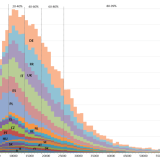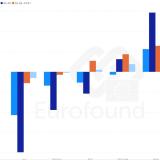
Emprego e mercados de trabalho
O emprego e os mercados de trabalho são uma das seis principais atividades do programa de trabalho da Eurofound para o período de 2021-2024. A Eurofound continuará a funcionar como centro especializado para a monitorização e análise dos desenvolvimentos no mercado de trabalho, em particular num momento em que os mercados de trabalho europeus são confrontados com grandes desafios na sequência da pandemia de COVID-19. As suas atividades de recolha de dados e de investigação centrar-se-ão nas consequências da pandemia para o trabalho e o emprego, e em formas de manter o funcionamento e a inclusividade do mercado de trabalho.
Durante o período 2021-2014, a investigação da Eurofound oferecerá perspetivas importantes sobre os desafios e previsões na área do emprego e dos mercados de trabalho na UE. A Eurofound tem um papel importante a desempenhar no acompanhamento das tendências do mercado de trabalho, bem como na monitorização do impacto destas tendências para os diferentes grupos de trabalhadores.
A investigação incidirá, em geral, na mudança da estrutura do mercado de trabalho, utilizando os instrumentos de acompanhamento bem estabelecidos da Eurofound, o Observatório Europeu do Emprego (EJM) e o Observatório Europeu da Reestruturação (ERM), juntamente com os dados do Eurostat. Com elevados níveis de desemprego esperados em alguns países, regiões, setores e profissões, afetando também os trabalhadores mais precários e vulneráveis, estes instrumentos ajudarão a identificar setores, profissões e qualificações em crescimento e em declínio. O ERM continuará igualmente a analisar eventos de restruturação de grande escala, instrumentos legislativos e de apoio, bem como medidas desenvolvidas pelos parceiros sociais e pelas autoridades públicas para ajudar os trabalhadores a transitar entre empregos ou setores.
A Eurofound centrar-se-á também na escassez de mão de obra e na subutilização de recursos humanos e talento em determinados setores e profissões, acentuadas durante a pandemia, explorando as intervenções políticas e as práticas das empresas. Os temas específicos incluirão o desajuste de competências , as horas de trabalho , a mobilidade geográfica ou profissional, e a integração dos migrantes , e abrangerão os grupos sub-representados no mercado de trabalho, como os jovens, as mulheres e as pessoas com deficiência . A Eurofound irá ainda analisar os setores tradicionalmente afetados pela escassez de mão de obra, uma questão que se tornou mais urgente devido à pandemia. Esta atividade contribuirá para os trabalhos preparatórios da próxima edição do Inquérito Europeu às Empresas (ECS) .
A colaboração da Eurofound com o Centro Comum de Investigação (CCI) da Comissão Europeia continuará também neste domínio. A investigação sobre a reestruturação contribuirá para as atividades do Fundo Europeu de Ajustamento à Globalização (FEG) e do Fundo Social Europeu+ (FSE+). Serão exploradas as relações com a agência-irmã Cedefop e a Autoridade Europeia do Trabalho no que diz respeito às competências e à mobilidade laboral no contexto das políticas de emprego destinadas a fazer face à escassez de mão de obra.
- Infografia: Emprego e mercados de trabalho na UE
«Seis em cada dez pessoas continuam a estar abrangidas por contratos de duração indeterminada e não limitada no tempo. Embora os números que temos sobre "emprego atípico", ou seja, trabalho a tempo parcial e a termo certo, não tenham realmente mudado nos últimos cinco a dez anos, eles escondem um movimento para formas de trabalho mais precárias e quem está abrangido por contratos precários não tem o mesmo acesso ao emprego ou à proteção social.»
Tina Weber, Gestora de Investigação, Unidade de Emprego







































